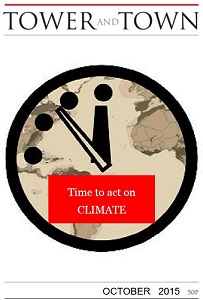

Tower and Town, October 2015 (view the full edition) (view the full edition)Soils, Climate Change and a Crisis in AgricultureSoil is one of nature's most complex ecosystems and one of the most diverse habitats on earth: it contains a myriad of different organisms, which interact and contribute to the global cycles that make all life possible. Nowhere in nature are species so densely packed as in soil communities; however, this biodiversity is little known as it is largely invisible to the human eye. The soil is a major store of carbon, holding more than our atmosphere and vegetation combined. The way that we treat our soils also has a massive impact on climate change: on the one hand, soil can sequester huge amounts of carbon to prevent carbon dioxide being released into the atmosphere, while on the other, it can be involved in the release of the most potent greenhouse Gases. The regular use of aerobically rotted compost, conservation/zero tillage and the establishment of agro-forestry systems will conserve carbon within the soil. However, annual ploughing destabilises soil structure, releases carbon dioxide into the atmosphere and increases erosion. The emission of potent greenhouse gases, such as methane and nitrous oxide, occurs when fermenting farmyard manure is sprayed onto fields or excessive amounts of nitrogen fertiliser are applied. The UN Food and Agriculture Organisation (FAO) was so alarmed that 5-7 million hectares of agricultural land, including 25 million tonnes of topsoil, are being lost each year, through erosion and degradation, that it designated 2015 as the 'International Year of Soils'. It has been estimated that the UK only has 100 harvests left in its soil due to intensive over-farming and scientists warn that the UK is facing an "agricultural crisis" unless dramatic action is taken to reverse this depletion in soil nutrients. Researchers from the University of Sheffield found that soils under Britain's allotments were significantly healthier than intensively farmed soils. The industrial farming model is clearly unsustainable as it threatens our long-term food security as well as significantly contributing to climate change. More info about the FAO's International Year of Soils at www.fao.org/soils-2015 Dr Sam LJ Page |